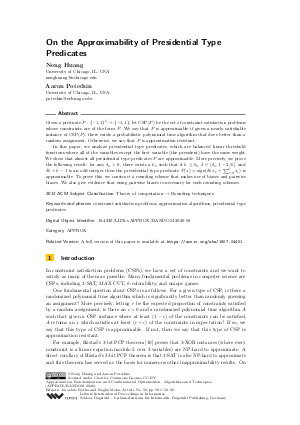On the Approximability of Presidential Type Predicates
Authors Neng Huang, Aaron Potechin
-
Part of:
Volume:
Approximation, Randomization, and Combinatorial Optimization. Algorithms and Techniques (APPROX/RANDOM 2020)
Part of: Series: Leibniz International Proceedings in Informatics (LIPIcs)
Part of: Conference: International Conference on Randomization and Computation (RANDOM)
Part of: Conference: International Conference on Approximation Algorithms for Combinatorial Optimization Problems (APPROX) - License:
 Creative Commons Attribution 3.0 Unported license
Creative Commons Attribution 3.0 Unported license
- Publication Date: 2020-08-11
File

PDF
LIPIcs.APPROX-RANDOM.2020.58.pdf
- Filesize: 0.51 MB
- 20 pages
Document Identifiers
Related Versions
-
A full version of this paper is available at https://arxiv.org/abs/1907.04451.
Subject Classification
ACM Subject Classification
- Theory of computation → Rounding techniques
Keywords
- constraint satisfaction problems
- approximation algorithms
- presidential type predicates
Metrics
- Access Statistics
-
Total Accesses (updated on a weekly basis)
0PDF Downloads0Metadata Views
Abstract
Given a predicate P: {-1, 1}^k → {-1, 1}, let CSP(P) be the set of constraint satisfaction problems whose constraints are of the form P. We say that P is approximable if given a nearly satisfiable instance of CSP(P), there exists a probabilistic polynomial time algorithm that does better than a random assignment. Otherwise, we say that P is approximation resistant.
In this paper, we analyze presidential type predicates, which are balanced linear threshold functions where all of the variables except the first variable (the president) have the same weight. We show that almost all presidential type predicates P are approximable. More precisely, we prove the following result: for any δ₀ > 0, there exists a k₀ such that if k ≥ k₀, δ ∈ (δ₀,1 - 2/k], and {δ}k + k - 1 is an odd integer then the presidential type predicate P(x) = sign({δ}k{x₁} + ∑_{i = 2}^{k} {x_i}) is approximable. To prove this, we construct a rounding scheme that makes use of biases and pairwise biases. We also give evidence that using pairwise biases is necessary for such rounding schemes.
Cite As Get BibTex
Neng Huang and Aaron Potechin. On the Approximability of Presidential Type Predicates. In Approximation, Randomization, and Combinatorial Optimization. Algorithms and Techniques (APPROX/RANDOM 2020). Leibniz International Proceedings in Informatics (LIPIcs), Volume 176, pp. 58:1-58:20, Schloss Dagstuhl – Leibniz-Zentrum für Informatik (2020)
https://doi.org/10.4230/LIPIcs.APPROX/RANDOM.2020.58
BibTex
@InProceedings{huang_et_al:LIPIcs.APPROX/RANDOM.2020.58,
author = {Huang, Neng and Potechin, Aaron},
title = {{On the Approximability of Presidential Type Predicates}},
booktitle = {Approximation, Randomization, and Combinatorial Optimization. Algorithms and Techniques (APPROX/RANDOM 2020)},
pages = {58:1--58:20},
series = {Leibniz International Proceedings in Informatics (LIPIcs)},
ISBN = {978-3-95977-164-1},
ISSN = {1868-8969},
year = {2020},
volume = {176},
editor = {Byrka, Jaros{\l}aw and Meka, Raghu},
publisher = {Schloss Dagstuhl -- Leibniz-Zentrum f{\"u}r Informatik},
address = {Dagstuhl, Germany},
URL = {https://drops.dagstuhl.de/entities/document/10.4230/LIPIcs.APPROX/RANDOM.2020.58},
URN = {urn:nbn:de:0030-drops-126612},
doi = {10.4230/LIPIcs.APPROX/RANDOM.2020.58},
annote = {Keywords: constraint satisfaction problems, approximation algorithms, presidential type predicates}
}
Author Details
References
-
Per Austrin, Siavosh Benabbas, and Avner Magen. On Quadratic Threshold CSPs. In Alejandro López-Ortiz, editor, LATIN 2010: Theoretical Informatics, Lecture Notes in Computer Science, pages 332-343. Springer Berlin Heidelberg, 2010.

- Per Austrin and Johan Håstad. Randomly Supported Independence and Resistance. SIAM Journal on Computing, 40(1):1-27, January 2011. URL: https://doi.org/10.1137/100783534.
- Per Austrin and Johan Håstad. On the usefulness of predicates. ACM Transactions on Computation Theory, 5(1):1:1-1:24, May 2013. URL: https://doi.org/10.1145/2462896.2462897.
- Per Austrin and Subhash Khot. A characterization of approximation resistance for even k-partite CSPs. In Proceedings of the 4th conference on Innovations in Theoretical Computer Science, ITCS '13, pages 187-196, Berkeley, California, USA, January 2013. Association for Computing Machinery. URL: https://doi.org/10.1145/2422436.2422459.
- Per Austrin and Elchanan Mossel. Approximation Resistant Predicates from Pairwise Independence. Computational Complexity, 18(2):249-271, June 2009. URL: https://doi.org/10.1007/s00037-009-0272-6.
- Siu On Chan. Approximation Resistance from Pairwise-Independent Subgroups. J. ACM, 63(3):27:1-27:32, August 2016. URL: https://doi.org/10.1145/2873054.
- Michel X. Goemans and David P. Williamson. Improved Approximation Algorithms for Maximum Cut and Satisfiability Problems Using Semidefinite Programming. J. ACM, 42(6):1115-1145, November 1995. URL: https://doi.org/10.1145/227683.227684.
-
Venkatesan Guruswami, Daniel Lewin, Madhu Sudan, and Luca Trevisan. A Tight Characterization of NP with 3-Query PCPs. In Proc. of the 39th Symposium on Foundations of Computer Science, pages 8-17. IEEE, 1998.

-
Gustav Hast. Beating a Random Assignment : Approximating Constraint Satisfaction Problems. PhD thesis, KTH Royal Institute of Tehnology, Sweden, 2005.

- Johan Håstad. Some Optimal Inapproximability Results. J. ACM, 48(4):798-859, July 2001. URL: https://doi.org/10.1145/502090.502098.
-
Howard Karloff and Uri Zwick. A 7/8-Approximation Algorithm for MAX 3SAT? In Proceedings of the 38th Annual Symposium on Foundations of Computer Science, FOCS '97, page 406, USA, October 1997. IEEE Computer Society.

- Subhash Khot, Madhur Tulsiani, and Pratik Worah. A Characterization of Approximation Resistance. arXiv:1305.5500 [cs], May 2013. URL: http://arxiv.org/abs/1305.5500.
- Aaron Potechin. On the Approximation Resistance of Balanced Linear Threshold Functions. arXiv:1807.04421 [cs], July 2018. URL: http://arxiv.org/abs/1807.04421.
- Prasad Raghavendra. Optimal Algorithms and Inapproximability Results for Every CSP? In Proceedings of the Fortieth Annual ACM Symposium on Theory of Computing, STOC '08, pages 245-254, New York, NY, USA, 2008. ACM. URL: https://doi.org/10.1145/1374376.1374414.
